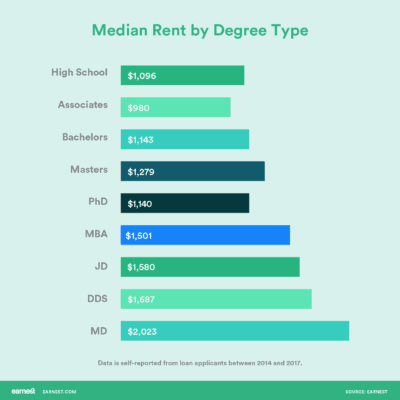In the Weeds
Pricenomics has a new report charting rent costs across the country. North Carolina was 21st out of the 44 states that provided sufficient data. The average rent was $1,226 per month compared to high water mark of $1,901 in California and the low water mark of $800 in West Virginia. Within the southern, mid-Atlantic states, Virginia was fourth at $1,600, Georgia was 24th at $1,200, South Carolina was 35th at $1,039.
In another metric, the report looked at the percentage of total income spent on rent. In that category, North Carolina was 33rd out of 44, with 15.4 percent of income going to rent statewide. The highest percentage was South Dakota at 24.8 percent, and the lowest was Arkansas at 12.8 percent.
The report also looked at rents in U.S. cities. No North Carolina city was among the top 20 most expensive cities for rent. However, at 13.9 percent, Durham was listed among the 10 cities with the lowest percentage of total income going to rent.
In addition, the report charted the average level of rent by education attainment:

The Other 49
There were several good pieces this week on policy work going on in other states.
- Inside Higher Education has a profile about the efforts to consolidate community colleges in Connecticut. Institutional consolidation is often romantically viewed as a hope for potential efficiency but often ends up exceeding expectations for complexity and cost. This profile lays out one state’s evaluation and provides a useful analog.
- Venture Beat looks at a new state-sponsored venture capital fund in Colorado directed at early state rural investments. The fund would place up to $12 million in rural areas. The article advocates a similar, federally sponsored program for rural investment.
- Brookings has a profile of Mobile, Alabama and how that city has taken on its $250 million backlog of deferred infrastructure maintenance. Deferred maintenance is defined “any delayed repairs that can lead to safety hazards and other costs,” and is an growing problem for state and local governments. It is a tightly written piece that gives a solid outline for other entities looking for a strategy around deferred maintenance.
- If the recent election result in New Jersey was not enough proof of tumult in that state, the American Enterprise Institute has a white paper illustrating some of the ways New Jersey is struggling. The title says it all: New Jersey Is Dying: A Special-Interest-Dominated Status Quo Is Hurting the State’s Economy. The piece is the fifth in a series about legal corruption in the state.
- Real Clear Health reports on Health Care Sharing Ministries (HCSMs) in Texas. The article has a fairly clear anti-Affordable Care Act slant but shines a useful light on how people and faith-based communities are adapting to the unstable health care environment. “HCSMs are associations of like-minded individuals who come together and agree to share members’ health care costs…Costs within an HCSM can be significantly less expensive than the premiums paid out for traditional health insurance through Obamacare exchanges.”
What we're reading
Why social media may not be so good for democracy
UNC Charlotte Professor Gordon Hull examines recent scholarship around social media, democracy, and our tendency to overly customize our information sources.... Read the rest-
When College Classrooms Become Ideologically Segregated, Everyone Suffers
-
How Universities Foster Economic Growth—and Democracy
-
What's Your (Epistemic) Relationship to Science?
-
The New 'Peace Corps' for Journalists
-
Today’s education system is perfectly designed for no one
-
Net States Rule the World; We Need to Recognize Their Power


